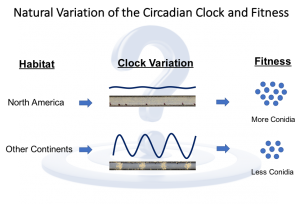
The circadian clock has been attributed as a fitness trait in multiple organisms from cyanobacteria to humans. However, the mechanism of habitat-specific circadian clock variation and its influence on fitness is not well understood. My focus at Dr. Lee’s lab is to understand the molecular mechanisms associated with natural variation of the circadian clock and its consequence mainly fitness using natural ecotypes of filamentous fungi Neurospora, which has been well characterized to study circadian rhythms. Our preliminary data suggests the habitat-specific clock variation is involved local adaption of Neurospora species, which has been adapted to two different habitats under or above tree bark. We also have been observed that the consequence of habitat-specific clock variation on fitness. We are in the process of identifying causative genes responsible for habitat-specific clock variation using QTL and RNA sequencing analysis. Our data suggest new insights into a mechanism by which local adaptation of circadian regulation influences its reproductive fitness.